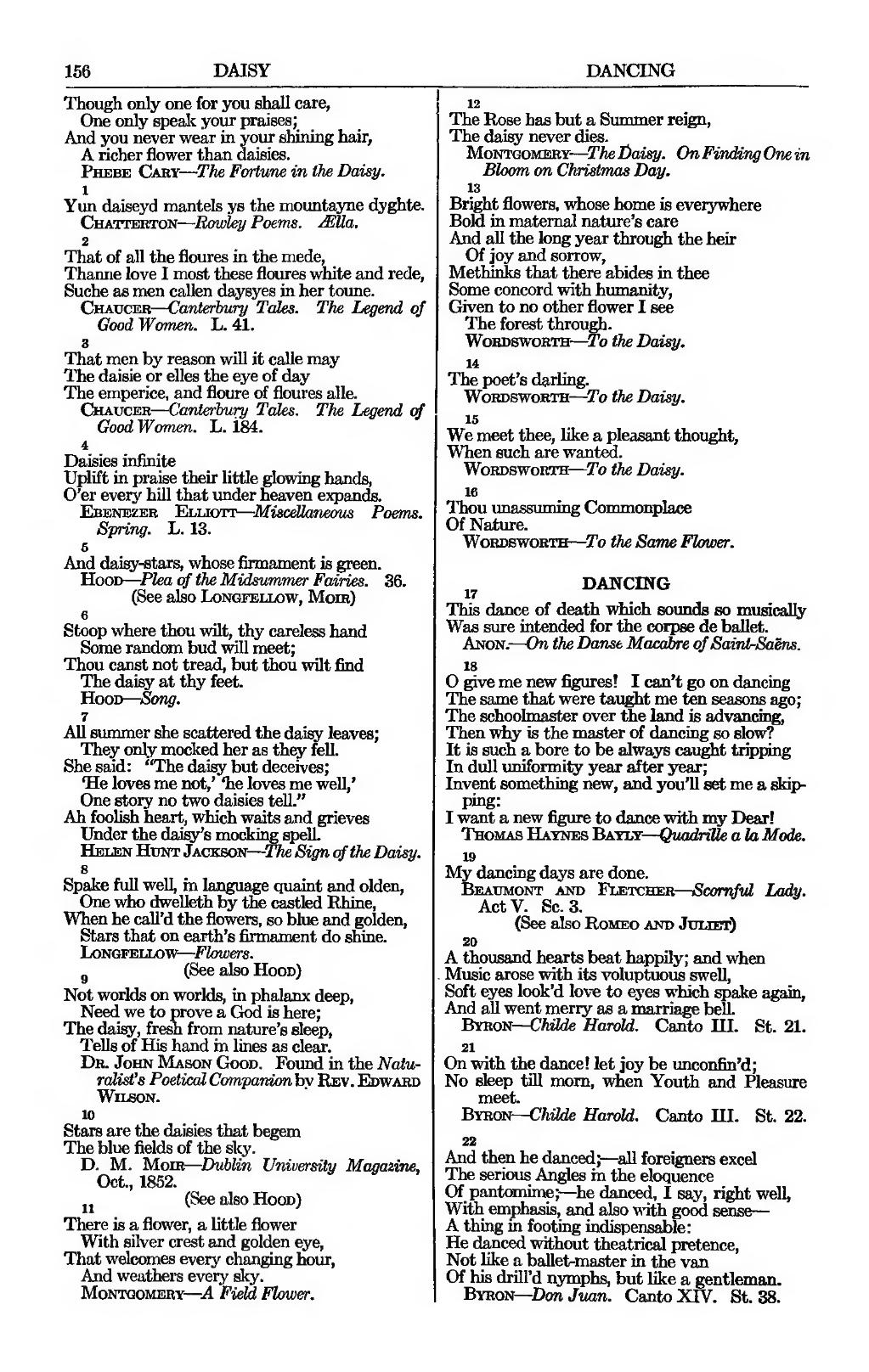Yun daiseyd mantels ys the mountayne dyghte.
That of all the floures in the mede,
Thanne love I most these floures white and rede,
Suche as men callen daysyes in her toune.
That men by reason will it calle may
The daisie or elles the eye of day
The emperice, and floure of floures alle.
Chaucer—Canterbury Tales. The Legend of
Good Women. L. i84.
Daisies infinite
Uplift in praise their little glowing hands,
O'er every hill that under heaven expands.
Ebenezer Elliott—Miscellaneous Poems.
Spring. L. 13.
| author =
| work =
| place =
| note =
| topic = Daisy
| page =
}}
{{Hoyt quote
| num = 5
| text = And daisy-stars, whose firmament is green.
Hood—Plea of the Midsummer Fairies. 36.
| seealso = (See also Longfellow, Mom)
| topic = Daisy
| page =
}}
{{Hoyt quote
| num =
| text = <poem>Stoop where thou wilt, thy careless hand
Some random bud will meet;
Thou canst not tread, but thou wilt find
The daisy at thy feet.
Hood—Song.
All summer she scattered the daisy leaves;
They only mocked her as they fell.
She said: "The daisy but deceives;
He loves me not,' lie loves me well,'
One story no two daisies tell."
Ah foolish heart, which waits and grieves
Under the daisy's mocking spell.
| author = Helen Hunt Jackson
| work = The Sign of the Daisy.
Spake full well, in language quaint and olden,
One who dwelleth by the castled Rhine,
When he call'd the flowers, so blue and golden,
Stars that on earth's firmament do shine.
| author = Longfellow
| work = Flowers.
| seealso = (See also {{sc|Hood)
Not worlds on worlds, in phalanx deep,
Need we to prove a God is here;
The daisy, fresh from nature's sleep,
Tells of His hand in lines as clear.
Dr. John Mason Good. Found in the Naturalist's Poetical Companion by Rev. Edward
Wilson.
Stars are the daisies that begem
The blue fields of the sky.
D. M. Mom—Dublin University Magazine,
Oct., 1852.
(
| seealso = (See also {{sc|Hood)
There is a flower, a little flower
With silver crest and golden eye,
That welcomes every changing hour,
And weathers every sky.
Montgomery—A Field Flower.
The Rose has but a Summer reign,
The daisy never dies.
Montgomery—Thefiaisy. On Finding One in
Bloom on Christmas Day.
Bright flowers, whose home is everywhere
Bold in maternal nature's care
And all the long year through the heir
Of joy and sorrow,
Methinks that there abides in thee
Some concord with humanity,
Given to no other flower I see
The forest through.
Wordsworth—To the Daisy.
u
The poet's darling.
Wordsworth—To the Daisy.
We meet thee, like a pleasant thought,
When such are wanted.
Wordsworth—To the Daisy.
Thou unassuming Commonplace
Of Nature.
Wordsworth—To the Same Flower.
DANCING
This dance of death which sounds so musically
Was sure intended for the corpse de ballet.
Anon.—On the Danst Macabre of SaintrSaens.
give me new figures! I can't go on dancing
The same that were taught me ten seasons ago;
The schoolmaster over the land is advancing,
Then why is the master of dancing so slow?
It is such a bore to be always caught tripping
In dull uniformity year after year;
Invent something new, and you'll set me a skipping:
want a new figure to dance with my Dear!
Thomas Haynes Bayly—Quadrille a la Mode.
My dancing days are done.
| author = Beaumont and Fletcher
| work = Scornful Lady.
Act V. Sc. 3.
| seealso = (See also Romeo and Jultet)
| topic = Dancing
| page =
}}
{{Hoyt quote
| num =
| text = <poem>A thousand hearts beat happily; and when
Music arose with its voluptuous swell,
Soft eyes look'd love to eyes which spake again,
And all went merry as a marriage bell.
Byron—Childe Harold. Canto III. St. 21.
On with the dance! let joy be unconfin'd;
No sleep till morn, when Youth and Pleasure
meet.
| author = Byron
| work = Childe Harold. Canto m. St. 22.
And then he danced;—all foreigners excel
The serious Angles in the eloquence
Of pantomime;—he danced, I say, right well,
With emphasis, and also with good sense—
A thing in footing indispensable:
He danced without theatrical pretence,
Not like a ballet-master in the van
Of his drill'd nymphs, but like a gentleman.
Byron—Don Juan. Canto XIV. St. 38.

